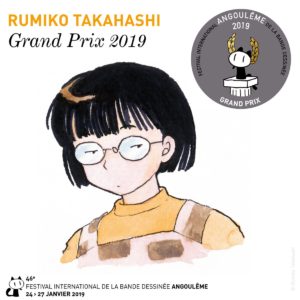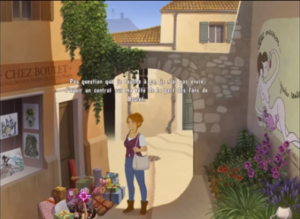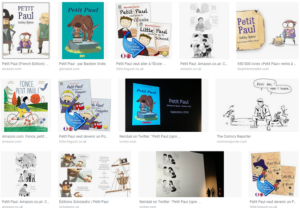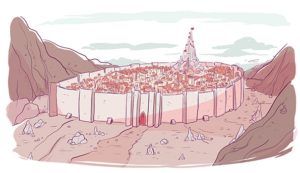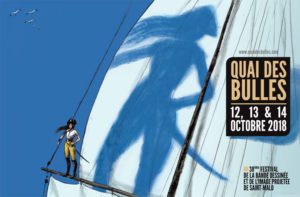
Fleen Senior French Correspondent Pierre Lebeaupin was tasked to attend the Quai de Bulles BD festival and report back. Please enjoy the approximately 2700 words he filed, which is beastly amount of work.
Just like last year, I had a great time at Quai des Bulles chatting with creators, visiting exhibitions, attending panels, and of course buying comics (Akileos did have the French edition of Stand Still, Stay Silent book one for instance), but the most interesting event was definitely this interview of Laurel which is transcribed at the end of the post: she had not signed her comics in France in the last 6 years, and so was eagerly expected.
I was able to chat with her at her booth on Sunday, and it had gone well: she and Adrien already knew they had made back their expenses, and she was glad to meet readers in this fashion again; she is not stopping, as she has more festivals planned even just this year.
One note: the meetup occurred on Friday, and this year the festival occurred outside of school holidays, so the auditorium was filled with school children (most about 10, some in the 14-15 range) which made for a very nice ambiance. Seriously.
______________
[Editor’s note: FSFCPL has produced an account of the interview, but this should not be taken as a series of literal quotations. For starters, Laurel and Adrien should not be taken to referring to themselves in the third person.]
Present were Laurel and Adrien Duermael, interviewed by Arnaud Wassmer.
What is Laurel doing today?
Laurel: She has always wanted to do comics, and when blogs started appearing, she put online what she considered a kind of diary. It took off, and accumulated a community as it went on. She claims to have the first blog BD (French-language comics blog) as she started it in 2003, after which she was joined by Boulet, Mélaka, Maliki, etc.
What was her initial intent?
Laurel: First of all, her pen name comes from Laureline, her actual surname (which itself comes from Valérian comics). These days Internet and the web enable young newcomers to start out from wherever they are, without the need to enter an artist studio. She taught herself (she did not pursue studies beyond the Baccalauréat [Author’s note: equivalent of the A-levels/high school diploma]), and she wanted to do it from her childhood reads.
What kind of stories doe she tell? Why autobio?
Laurel: It’s not because she’s self-centered; since she started out with a blog, she fed it with daily life stories, and that continued into her books: the characters were already ready, and she could more readily count on her community to buy them.
Adrien: As time goes on, you fall more easily into an observer role, ready to take note of relevant situations.
Laurel: It doubles as a way to be able to recount these stories to their own children, when they will be older.
So the children are taken along in the ride. How to set the limit between what you can tell and what is too intimate, and in a related question, how much storytelling versus literal telling is put in the stories?
Laurel: Everything is true. But the matter of making the children uncomfortable? Good question … At the same time, they tell very ordinary things about them (doing the dishes, school grades), nothing really intimate, even the story of expecting her second child that she’s telling has nothing specially revealing.
Doesn’t she risk fanning jealousy between her children?
Laurel: Her eldest Cerise does have her own book series …
What about the animals?
Adrien: Squirrels were often used to for narration, especially to tell of negative events, express messages, that sort of thing.
Laurel: Indeed, to have the squirrels complain while telling what happened is a good storytelling technique.
Laurel is drawing on a tablet these days. Why?
Laurel: She worked for 10 years on paper, even when she put colors digitally back then she did it with a mouse… But when she started working on video games, she had to switch to a graphic tablet for productivity reasons: games need tons of assets, and drawing on a tablet avoids having to scan the original, clean the lines digitally, etc.
Nevertheless, it did require her 6 months to get used to the graphic tablet, then 6 more months to be really comfortable with it. The material (texture, etc.) is not the same, and you have additional latency before the stroke appears as well as an air gap; and that is without mentioning technical parameters to worry about such as file resolution. She does however appreciate the possibility to cancel: she often retries the same stroke 10 times in order to get a clean one.
Adrien: Cerise is more comfortable with tablets than Laurel is.
What are her graphical influences?
She was influenced by Pénélope Bagieu, also by games such as Legend of Zelda: Phantom Hourglass on Nintendo DS; for the last 6-7 years she has had her own style.
Which is very expressive.
Adrien: Indeed, and for the messages of Comme Convenu, this is very useful to convey them, like for animation.
Laurel: Nevertheless, she considers that part of her work to be in line with French-Belgian comics traditions.
Here we see some panels before inking.
Laurel: One important part of the panels is their size: at the beginning Comme Convenu was not designed for a book, but they instead considered going for a mobile app, and therefore every panel was the size of a mobile phone screen, with 4 of them fitting an iPad screen. Then they did a book with that layout.
Adrien: The application never saw the light of the day, and it was easier to design that way than to design pages for A4, then try and cram them in a phone screen.
But does this change the way you tell the story, how to think in term of story rhythm?
Laurel: She tried to think in terms of multiples of 4 panels, and then on a larger scale to have breaks on the story fall on Fridays.
Adrien: Though it is a single story.
Laurel: Indeed, so the breaks were sometimes cliffhangers to get readers to return the week after…
Why then publish on paper?
Laurel: She wasn’t even sure at the start whether she would get to complete it or not, but with readers coming in and comments, she was encouraged especially as it provided her with an outlet next to her difficult day job; it was nevertheless taking her 6 hours of work per page. When she proposed it to publishers, she was proposed 8000€ [Author’s note: of advances, though that is often the only thing creators earn these days) for 3 years of work: there was no way she was going to accept that.
Does it make a difference in the story if it is published online or traditionally?
Adrien: Regardless, it is important for them that this story was published on paper in the end, as he saw multiple video games he worked on virtually disappear (no physical artifact remaining) when they were pulled from sale: here something concrete will remain. But it makes a difference for it to have been prepublished on an interactive medium, such as the ability to be reacting to feedback when continuing the story (as well as fixing typos).
Is she feeling pressure from comments? How to take them into account without compromising her work? Are they mostly positive or negative?
Laurel: Most commenters mean well, but sometimes she is not clear, and in one occasion she took a lot of heat and tried to address that by inserting a new page … which got heated comments as well, with much less justification this time. She realized that people demand because they like the feeling of being in control, without it being necessarily justified. She trusts Adrien to tell her when she ought to change something or if commenters are out of it. Twitter is sort of an additional comment stream, but on it people may not necessarily realize they are telling her something that 50 other people are telling her about already: it is not harassment per se, but a close equivalent.
Why did you move to California?
Laurel: Adrien is a software developer. In many aspects when developing applications it is better to be on location to meet Apple, Google, etc. So they uprooted their whole life and left with Cerise in tow.
Adrien: One advantage is that he previously went on holidays there; nevertheless when they started the business while still in France, and they would deal with the European offices of Apple for instance, as a result their apps would be promoted in France, but not worldwide. Coming to California was also important for them to meet other businesses in the same sector.
Laurel: It really is a super area, she had the feeling of being in a series.
How did the environment influence storytelling?
Laurel: Among other ways, she met with people from Pixar, and their work influenced her drawing style, more so than the move from paper to graphic tablet; she was also able to meet U.S. comics creators, go to conventions, and in general open herself to many different aspects of the local culture.
Adrien: He noticed there an important tradition of “artisanal” graphical expression, such as in burger restaurant menus, or lettering in coffee shops.
It was not exactly smooth sailing, hence the origin of Comme Convenu.
Laurel: They had a work visa, meaning if they were fired, they couldn’t stay, and they did not have the means to move back to France, plus they did not want Cerise to have to move again just after settling in. As a result they ended up having to unquestioningly obey their boss, Joffrey. They are not holding a grudge these days, but they suffered a lot at the time, especially when Cerise was involved, as a result this story had to come out. At the time they thought that, besides making an app out of it, it could allow their partners to see their side of the story and perhaps make them go off their backs, but that did not work.
Adrien: When Comme Convenu started they were really at their lowest anguish point.
Laurel: They were very protective of Cerise, as a result this story is also a way to tell her about these events in a time-shifted fashion.
Why use comics?
Laurel: It is the way she expresses herself. And when publishers showed interest but only proposed her insignificant revenues, she went: I’m going to show them how I can do it by myself.
Adrien: They had heard of Kickstarter, so given the ridiculous sums offered by publishers, they thought they had nothing to lose by going with crowdfunding, so they went with it. They were going to go with Kickstarter when Ulule took notice of them and proposed their platform, which had some benefits but in particular that of being oriented toward the French-speaking market for instance.
Could you elaborate on the crowdfunding concept for our audience?
Laurel: So you put your project up on the Internet on a platform such as Kickstarter or Ulule. You must have something to show already, and you’re asking people to chip in. They asked for 9000€ (US$10,300 then) which would have allowed them to print the book (which would have cost US$15,000) using an additional loan, and if that sum is reached the book is printed.
For the second campaign it is claimed the goal was reached in 6 minutes.
Laurel: Having a promo video helps a lot for promoting the crowdfunding, she doesn’t like doing them at all but it worked. The first campaign collected more than 8000 pledges for as many copies of the book, much more than she would have been able to do with traditional publishing. She is not throwing them any stone, but there they are.
Here the audience can see her with the printer.
Laurel: It was a California company, Global PSD, recommended by another French-American creator. She tried to get involved every step of the way, and she managed to have goodies (stickers, etc.) put along with the books.
And here the audience can see pallets and boxes of books being opened …
Laurel: They had 800 books shipped to their home in order to sign them, and they assembled the bundles of goodies by hand, including Cerise.
And they went with crowdfunding again for the second book.
Laurel: That allowed them to keep owning all the rights to the book and use them as they like later, for instance for a digital edition. They own everything.
Adrien: As a team, they own everything. While for her other comics books, they ended up seeing them on apps without being told about it.
And now everyone can read it.
Laurel: They wanted it to be available for everyone on the Internet, people in the audience can go read the 500 pages right now if they want.
Now the audience can see some of the pages from the book …
Adrien: Their cat, Brume, is indeed useful here to materialize the question they were asking themselves: why were they allowing themselves to get exploited?
Now they are back in France. What’s next?
Laurel: Right now she is telling her experience of expecting a baby (and side stories) in California.
Adrien: First it deals with the adventures in a video game studio, then with expecting a baby, but in fact it is larger than that.
What is Adrien’s opinion on his drawn double?
Adrien: I do see myself in him, well OK I’m less scrawny, but in all seriousness I find myself well drawn. In that story we are together, after a few more years have passed I would like to read it again.
[Adrien exits stage left. Now the public is allowed to ask questions.]
Will she do comics in a different style?
For now she sticks to what she is doing, but she previously did about 15 books: classic Cerise books for instance. When she will be done with her current project, in about 3 years, she will see.
Is she considering doing prose?
No, she needs to draw; writing is a very different job, but it is true that Diglee and Maliki are managing it.
She worked with Adrien for recollecting their memories of the story, did she do the same with Cerise?
Yes, Cerise was able to show her viewpoint at the end of Comme Convenu.
Were scenes changed or interpreted differently?
The names were changed, that’s it, but of course there are exaggerations, such as the size of a spider, but the dialogs occurred as shown.
How much time did they stay in California?
Five years, they would have stayed but could not renew their visas, now they are located near Vannes as Adrien has family nearby.
Do they intend to make video games in the future?
They do have projects to that end, they love developing games. They are proud of making games without ads, interesting, pretty, and out of people who download them there are people who appreciate that and allow one to make a living out of it.
What takes the most time, the scenario or the drawing stage? Would you consider you would need help on the scenario side or the drawing side?
Before she did draw scenarios from others. What she finds the hardest is dialogs and the process of dividing the scenario into pages and panels; however sketching and inking she feels are faster and more pleasant, and she can do so while watching series anyway. However, she has to watch against losing concentration because of social networks. She would rather work with a scenarist.
Would she like living in the U.S. again?
She would love to; her two youngest were born in the U.S., so they could claim citizenship when the time comes, but it is harder and harder to come, lately her immigration applications were solid but rejected anyway, she is not entertaining too many illusions. They will be able to come the U.S. for holidays already.
What games did she work on?
With the warning that they may or may not be online any more: Grub, which is a kind of snake by tilting the phone, and Greedy Grub, which is a village management game. They recovered the rights to them and are preparing a release, including on Android.
Thanks as always to FSFCPL for his unerring sense of interesting stories and creators in the intersection of BD and webcomics.
Spam of the day:
Used by all military, police, fireman and astronauts personnel. So powerful it can over e miles of light It can protect you more then a knife or gun
It’s a flashlight. And what kind of threats do you think astronauts are facing that they need the flashlight that’s more powerful than knives and guns?
